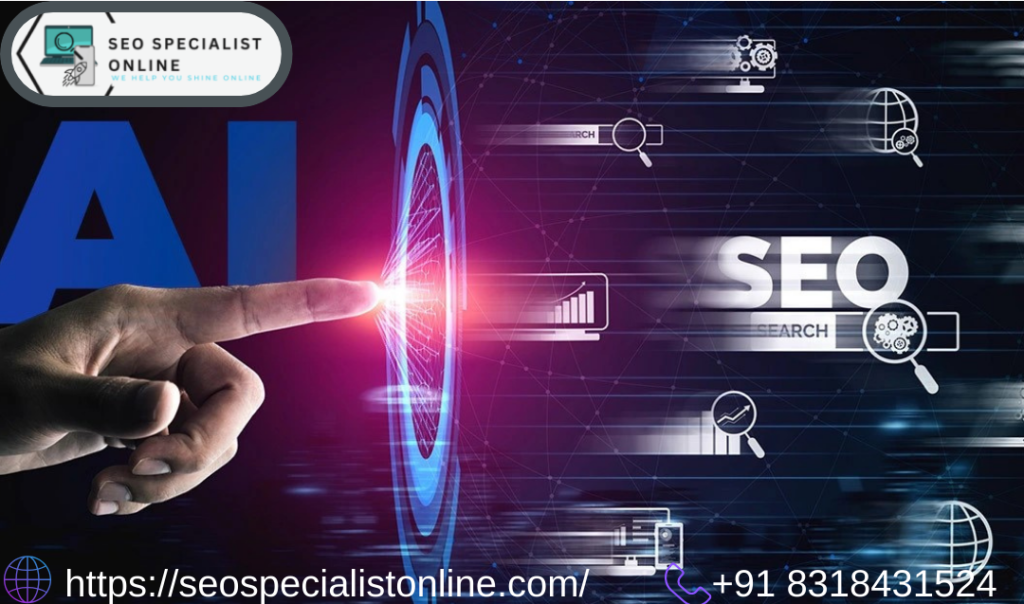
In recent years, Artificial Intelligence (AI) has dramatically transformed various industries, and Search Engine Optimization (SEO) is no exception. AI on SEO is changing the way search engines function and how marketers approach SEO strategies. AI is reshaping the SEO landscape from advanced algorithms that understand user intent to intelligent tools for optimizing content. Here, we explore the key ways AI impacts SEO and what it means for businesses and digital marketers.
Understanding User Intent with AI
AI-powered search engines like Google use refined algorithms, such as RankBrain and BERT, to better understand user intent. Instead of merely focusing on keyword matching, these AI systems analyze the context behind search queries. For instance, BERT (Bidirectional Encoder Representations from Transformers) helps Google grasp the nuances of natural language, providing more accurate results even when users input complex or uncertain queries.
This shift has led to more focus on creating content that addresses user needs thoroughly. Marketers must now prioritize the intent behind search terms, not just the terms themselves. Understanding whether a user is looking for information, products, or specific services allows SEO experts to tailor content more effectively, ensuring it matches the user’s search intent.
Voice Search Optimization
Advancements in AI have directly contributed to the increasing popularity of voice search. Virtual assistants like Siri, Alexa, and Google Assistant rely on AI to process spoken queries. Since voice searches tend to be more conversational and longer than text queries, SEO strategies must adapt accordingly.
AI’s role in interpreting voice commands is to make long-tail keywords more relevant. SEO experts focus on natural language and question-based queries to optimize voice search. This trend highlights the importance of creating content that answers common questions in a clear, concise manner.
AI-Driven Content Creation and Optimization
AI tools like Jasper AI, Grammarly, and MarketMuse enable marketers to optimize content more efficiently. These tools can suggest keyword placement, improve readability, and even create SEO-friendly content based on predefined guidelines. With AI, content creation is becoming more data-driven, ensuring that the right keywords, tone, and structure are used to match search engine algorithms.
Additionally, AI-driven content optimization tools help monitor trends and user behavior in real time. By analyzing large datasets, AI can recommend content updates to align with changing search engine requirements or evolving user interests, keeping websites competitive.
Predictive Analytics for SEO
AI’s predictive analytics capabilities allow marketers to predict changes in search behavior. By analyzing historical data and current trends, AI tools can predict future search patterns, helping marketers develop dedicated SEO strategies. This predictive approach enables businesses to stay ahead of competitors and prepare for potential shifts in search engine algorithms or user preferences.
For instance, AI can predict which keywords are likely to gain popularity or which types of content will perform well in the coming months. By leveraging these insights, marketers can create future-proof SEO strategies that adapt to real-time changes.
Enhanced User Experience (UX)
Search engines are increasingly using user experience as a significant measure for determining website rankings. AI algorithms assess UX factors, including page load speed, mobile-friendliness, and site navigation, to determine a site’s overall ranking. For example, Google’s Core Web Vitals, which focus on user experience metrics like loading time and interactivity, are heavily influenced by AI.
Marketers now need to ensure their websites are optimized not just for search engines, but for user experience as well. AI tools can help identify areas where UX improvements are needed, leading to higher engagement and better rankings. A seamless and satisfying user experience will naturally result in lower bounce rates and higher search rankings, as AI rewards sites that cater to user expectations.
Automation of Routine SEO Tasks
One of the most significant impacts of AI on SEO is the automation of time-consuming tasks. From keyword research to content audits, AI-powered tools like Semrush, Ahrefs, and Moz can automate various SEO processes, freeing up time for more strategic planning. These tools can track rankings, identify backlink opportunities, and provide data-driven insights that help marketers refine their strategies.
By automating routine tasks, AI allows marketers to focus on creative and strategic aspects of SEO, such as crafting high-quality content and developing link-building campaigns.
AI-Powered Image and Video Search
Visual content is becoming increasingly important in SEO, and AI is making significant advancements in image and video search. Tools like Google Lens and AI-driven video search algorithms can now analyze and rank images and videos based on visual elements, rather than just metadata. This opens up new opportunities for marketers to optimize multimedia content for search engines.
To rank higher in image and video search, SEO strategies need to incorporate AI-powered techniques such as using descriptive file names, adding alt text, and ensuring that visual content is relevant to the user’s query.
Conclusion
AI is fundamentally transforming SEO, from improving search engine algorithms to enhancing user experience and automating challenging tasks. AI on SEO continues to evolve, meaning SEO strategies must adapt to stay relevant in this dynamic landscape. The focus is shifting toward understanding user intent, optimizing for voice and visual search, and utilizing predictive analytics to stay ahead of trends. For businesses and marketers, staying ahead in the AI-driven SEO world means embracing these changes and using AI-powered tools to craft strategies that provide both search engines and users with exactly what they’re looking for.

One Response